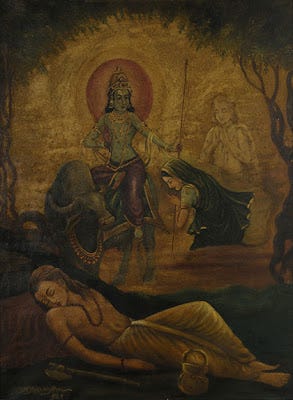pillars of salt
Orpheus loved her so intensely he would bring her back from the dead. Because Orpheus loved her so intensely, he couldn’t bring her back from the dead
Have you heard about the grandest gesture in fictive romance? The lyrist, whose unutterable grief had strung him out to traverse the pits of hell and play the most euphonious melody of life, knelt before the God of Death for the resurrection of his beloved. You must have heard about it. After all, it’s only the greatest romance in our mystical anecdotes. Outlandish it may seem, but our stories measured love by this – the degree of grief.
Orpheus mourns Eurydice - Ary Scheffer, 1814
“Then I understood the true fate of Orpheus, that love is a constant terror of loss.” Kazimierz Wierzyński, tr. by Czeslaw Milosz, “A Word of Orphists”
Orpheus failed the only condition Hades gave in exchange for the life of Eurydice: he must not turn back his gaze to assure her presence as they trail back into the upper-world.
He ached for her – the rhythm of her footsteps, the feel of her flesh, the sound of her breathing. His hunger for her corporeal existence devoured him from within. So he looked too soon, and watched Eurydice fall back into the underworld, losing her for the second time around - eternally.
Eurydice recedes into the Underworld (Enrico Scuri, 1806-1884)
I once read about scholars debating if Orpheus was overcome by doubt, temptation, or if it was merely a careless mistake. People who heard the story often swore they would not be such a fool like Orpheus and fail a simple task. How hard it is not to look?
But this isn’t about a hero’s mortal frailness. It is about, I think, how a lost love is grieved forever.
Mythology tells the history of time when humans lived along with the gods. People ascribed deities to the natural world, to the things they couldn’t fully explain, like the weathers of the sky and the heart. Earthquake was a monster residing beneath the earth, the momentary disappearance of the sun was to meet the moon, orchids in the spring were nymphs that bloomed. Even their traits they did not consider as theirs – love, bravery, greed – were all bestowed by gods.
The myth of Orpheus and Eurydice was one calibration of love and loss. Their awareness of mortality and inevitability of death were mirrored in Orpheus’ failure to retrieve her.
This very theme resonates with several other tales. Long before stories were made of paper, they were told into the ether around a bonfire, in a gust of air in the middle of the ocean waving from empires to empires, for thousands and thousands of years.
Shinto religion , Japan
Primordial gods, Izanami and Izanagi, suffered a similar fate. Upon the death of the goddess, Izanagi followed her into the Yomi (underworld) only to learn she was forbidden to return to the mortal realm as she had eaten food from the underworld. It was nothing a plea could not fix, only Izanagi was given a rule that he must not look at her.
Like Orpheus, the god succumbed to his longing and glanced at Izanami. Izanagi saw the body of the goddess decomposing, and that was his last sight of his beloved.
Izanami and Izanagi (Kobayashi Eitaku)
Norse mythology
Then there’s Balder – whose bereaved wife passed away after his own death, while his brother, Hermod, was sent to the underworld for his revival. One term was set: all the beings in nature must weep for him. Every being shed a tear but the giantess Tökk, putting the gift of the goddess of death in vain.
Nez Percé (Nez Perce Tribe of Idaho)
In Coyote and the Shadow People, the hero Coyote underwent trials to revive the life of his wife lost to an illness. The death spirit approached him with a question, 'Coyote, do you pine for your wife?’ to which he ultimately answered yes, and was then promised that his wife would be with him throughout his crusade. Only he must never touch her until he finishes the journey.
Coyote could see nothing on the open grassland, as if his wife were just a shadow, but he swore he felt her presence.
In the last trial, however, Coyote was finally able to see her face and body in flesh very clearly – then a brisk, thoughtless itch seized him. He held his wife around his arms until she dispersed like prairie dust.
Coyote canoeing (F. N. Wilson - Curtis, Edward S. Indian Days of the Long Ago. Yonkers-on-Hudson: World Book Company, 1915. Page 84)
But there were also mythos that gave catharsis to this prayer.
Athenian tragedy
Alcestis willingly traded her fate with her husband, Admetus, who was set for an imminent death. But with Heracles rescuing her from the underworld, both lovers were saved in the end.
Hinduism
Savitri and Satyavan escaped the clutches of the god of death, Yama. Princess Savitri married fallen prince Satyavan, who was prophesied to die young. Savitri outwitted the deity after the latter promised to grant her one wish other than the life of her husband.
Savitri desired that Satyavan's father sees his grandchildren play at his palace. This wish single-handedly granted her three things: her husband, her father in law's sight and his fallen kingdom.
Savitri saving Satyavan from Yama (M. V. Dhurandhar 1924)
Despite the varied outcomes of their quests, the common theme is the heroes’ privilege to make a plea with the god of death. I wonder if these stories are simply about a love so immense its loss can’t be endured, or are they about humans suffering the blunt force of the sharp edge of grief?
To dream about the return of someone we lost, in sleep and in prayers, is an understandable human way to cope. Sometimes our faith will quiver, and we’ll be called bitter, and cynical. But it’s all part of being imperfect mortal beings, as Joan Didion once wrote, “When we mourn our losses we also mourn, for better or for worse, ourselves.”
Orpheus losing faith in the gods after he lost Eurydice for the second time was proof he was one of us. Mortals. Pangs of grief wavered his faith, there was no god he could trust again. This was the only way he knew to smoothen the jaggedness of bereaving.
“I'm in the depths of the abyss, and I no longer know how to pray.” Arthur Rimbaud, trans. by Mark Polizzotti, from A Season in Hell: “Deliria I”
In every version and retelling, Orpheus always turned around. I, for one, believe he always would. Upon the rattle of Eurydice stumbling, or even absent the hint of her presence – Orpheus would’ve ultimately looked back no matter what, because he wouldn’t have been able to bear it – the fact that she wasn’t there. He would always turn around because he loved her, and so the insatiable need to see her would always prevail. Mortal love is just like that: flawed, and foolish, and always yearns.
“Dying a second time, now, there was no complaint to her husband (what, then, could she complain of, except that she had been loved?).” Ovid’s The Story of Orpheus and Eurydice (trans. Rolfe Humphries)
The rich tapestry of mythos reveals these things to us – the contours of our fears, the despair for our limitedness, the intrinsic consequences we experience as human beings: love being astronomical and imperfect, the fickleness of fate, the finiteness of body.
Some argue that if Orpheus truly wanted to be with Eurydice, why had he not ended his life so soon as to follow her in the underworld? Today, whenever I hear a melancholic tune, I think of Orpheus and how he kept playing til he was on his deathbed, even when Eurydice had forgiven him. He knew neither regret nor guilt could purify his sin. Because should it happen again, he would always turn around and look at her.
Towards the end of his life, Orpheus disdained the worship of all gods except his father, Apollo–the god who gifted him his lyre.
“I'd be the voice that urged Orpheus
When her body was found
I'd be the choiceless hope in grief
That drove him underground
I'd be the dreadful need in the devotee
That made him turn around
And I'd be the immediate forgiveness
In Eurydice.”
Hozier (Talk, 2019)








